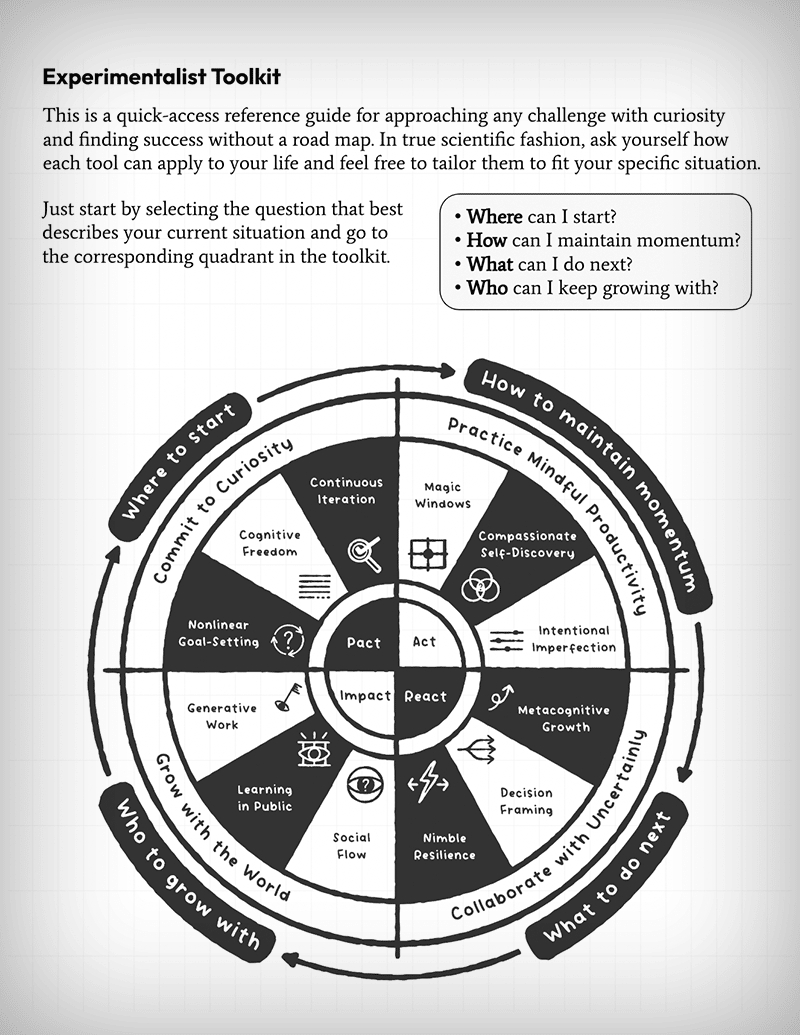[[Anne-Laure Le Cunff]]
[[lit/kindle/Tiny Experiments|Highlights]]
> In the liminal space called life, we are in perpetual transition from one identity to another, from one question to the next, a succession of twists and turns, each an opportunity to learn about the world and connect with others. Success is the lifelong experiment of discovering what makes you feel most alive.
Tiny experiments are the new Atomic Habits. The tyranny of habits (see [[Goodbye, Atomic Habits]]) led me to resist explicitly trying to start any new habits in the past few years. Le Cunff suggests an alternative, more affirming approach to the work of life.
My favorite insight from the book is her concept of Kairos time. As opposed to Chronos time, time as a quantity, Kairos time is a focus on the quality of time.
> To live in Kairos time, we need to shift the focus from what we do with our time to how we experience each moment—what you might call mindful productivity. It’s a simple idea, that making the most of our time isn’t about doing more but about being more: more present, more engaged, and more attuned to the quality of our experiences.
The formal process of Tiny Experiments might be summarized as
1. **Observe**. Notice what causes dissonance or disturbance in yourself. This indicates an area you might want to address. Notice what makes you feel good so you can figure out how to do more.
2. **Define a problem/opportunity statement.** As clearly and concisely as possible, what is the problem you want to solve or opportunity to pursue? This might take the form of a short context statement and a "how might we" question.
3. **Gather baseline data.** Spend some time gathering data. This is your chance to really understand it. Don't judge and don't try to change, yet. Be an anthropologist of your own life.
4. **Formulate a hypothesis**. Define what it is your experiment will test. For example, if I do X I will see Y.
5. **Create a PACT**. A pact takes the form "I will [action] for [duration]." This is your hypothesis reframed as action. PACT stands for Purposeful, Actionable, Continuous and Trackable. The duration should allow for repeated trials.
6. **Make a data collection plan.** Consider which data you will collect and how you will record it. If necessary, make an analysis plan as well. The simplest data to collect is what went well, what didn't, and what to do next ("plus, minus, next").
7. **Experiment**! Do the action for the defined duration. Collect data.
8. **Persist, pause or pivot.** After completing the experiment, decide whether you want to keep going, stop or try something else.
Rinse and repeat. With an experimental mindset you will engage in *growth loops* "where progress emerges in conversation with our environment. Each cycle adds a layer of learning to how we understand ourselves and the world around us. Instead of an external destination, our aspirations become fuel for transformation. *We don’t go in circles; we grow in circles* (emphasis added)."
Le Cunff includes a summary of her *Experimentalists Toolkit* in the appendix with a helpful summary of the key concepts from each chapter. Download the [full toolkit](https://nesslabs.com/toolkit) and a [template experiment log](https://docs.google.com/spreadsheets/d/1XrzyfTCGqabg8tI5BchnOWbN3hDeEXMTdF5VagxP6hU/template/preview).

The book's key insights, as summarized at the conclusion of the book, include
- Forget the finish line
- Unlearn your scripts
- Turn doubts into experiments
- Let go of the chronometer
- Make friends with procrastination
- Embrace imperfection
- Design growth loops
- Broaden the decision frame
- Dance with disruption
- Seek fellow explorers
- Learn in public
- Let go of your legacy